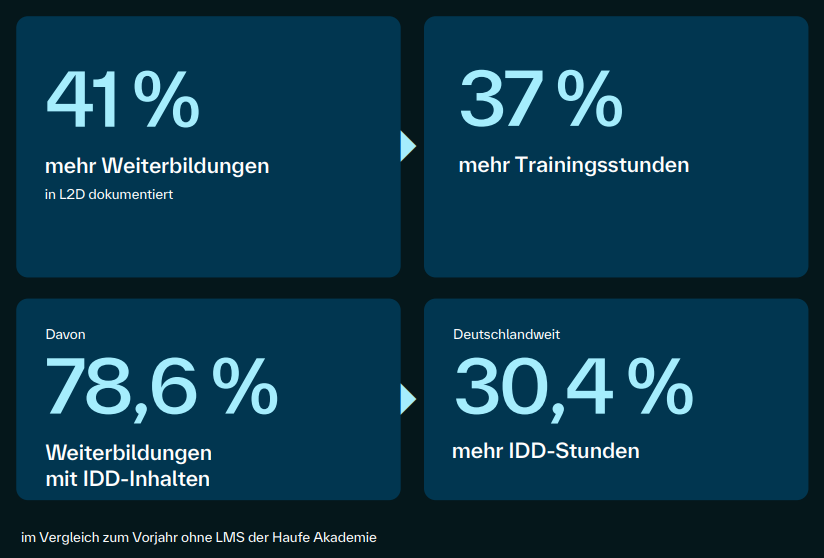IDD training obligation: requirements & implementation in insurance sales

As a company, are you facing the challenge of organizing the annual training obligation for your employees in insurance sales? The IDD training obligation is more than just a regulatory requirement - it strengthens the quality of advice and protects consumers. In this article, you will find out which specific requirements apply, who is affected and how you can efficiently organize and provide evidence of the required annual training hours.
IDD training obligation: the most important facts in brief
- The Insurance Distribution Directive (IDD) obliges all persons in insurance sales to complete 15 hours of further training per year - regardless of whether they work full-time, part-time or in marginal employment.
- Insurance brokers, employees with customer contact and all persons involved in insurance brokerage are affected.
- Insurance-related content such as product knowledge, consulting techniques, legal framework conditions and compliance training are recognized.
- They must keep the evidence for five years, with fines of up to 25,000 euros per team member concerned in the event of violations.
- Digital learning management systems automate documentation and create legally compliant evidence for audits.
What is the IDD training obligation?
The Insurance Distribution Directive (IDD) is an EU directive that was transposed into German law in 2018. It obliges all persons who broker insurance on a professional basis to undergo continuous further training. The aim: higher quality advice and better consumer protection.
The IDD training obligation ensures that insurance brokers and consultants are always up to date. New insurance products, changes in the legal situation or innovative advisory methods - regular training guarantees that your customers receive competent advice.
For companies, this means that investments in further training pay off in the long term. Well-trained employees reduce liability risks, improve customer satisfaction and strengthen trust in the industry.
Legal basis in Germany
In Germany, Section 34d of the GewO (Trade Regulation Act) regulates the basic requirements for insurance brokers. The specific details on the obligation to undergo further training can be found in the VersVermV (Insurance Mediation Ordinance).
The VersVermV implements the EU directive in concrete terms: All persons who broker or assist in brokering insurance must complete at least 15 hours of further training each year. This obligation applies regardless of the type of employment - whether full-time, part-time or marginally employed.
Who is subject to the training obligation?
You must fulfill the further training obligation for all employees who broker insurance on a professional basis or are involved in doing so. This includes
- Insurance brokers and independent intermediaries
- Employees with customer contact in insurance sales
- Employees in broker pools and sales organizations
- Advisors in bank branches that offer insurance products
The decisive factor is not the employment contract, but the actual advisory activity. Employees who advise customers on insurance or broker contracts are subject to the IDD training obligation.
Special features & exceptions
Part-time employees and marginally employed persons must also complete the full number of hours - there is no provision for a reduction in proportion to working hours.
Exceptions apply in special situations:
- In the event of prolonged illness, the responsible IHK may grant an extension of the deadline.
- The training obligation is suspended during parental leave.
- New employees have reduced requirements in their first year.
- Anyone who has not worked in insurance sales for the entire calendar year is exempt.

Recognized contents & topics
Not every training course meets the requirements of the IDD training obligation. The content must relate to the insurance activity and strengthen professional competence. The focus here is on the quality of the training: superficial short courses do not meet the requirements. Instead, the content should deepen specialist knowledge and strengthen the quality of advice in the long term.
Recognized subject areas:
- Specialist knowledge of insurance products and current product developments
- Consulting techniques and professional customer communication
- Legal framework, compliance and data protection
- Consumer protection and ethical standards in sales
- Prevention of money laundering and financial crime
However, training courses on pure real estate financing, building society savings without an insurance component or general sales techniques without an insurance reference are not IDD-relevant.
Organize IDD training: Formats & implementation
You can choose different learning formats for the IDD continuing education requirement:
- Face-to-face training offers a direct exchange and intensive discussions. Seminars, workshops and specialist conferences are classic formats.
- Online training courses allow flexibility in terms of time and location. Webinars, e-learning modules or digital lectures are fully recognized.
- Self-study is possible, but requires a performance review. A test or a reflection task must document the learning success.
You can use internal and external training on an equal footing. Many companies combine both approaches: external expertise for new trends, internal training for product-specific knowledge.
Keeping & documenting IDD evidence correctly
Without proper documentation, even the best training is useless. You must document every hour you complete in a comprehensible manner.
Required information in the IDD proof:
- Name and address of the participating person
- Topic and content of the training
- Date, duration and provider of the training
- Confirmation of successful participation
You must keep the certificates for five years. The responsible Chamber of Industry and Commerce or BaFin (Federal Financial Supervisory Authority) can request proof at any time. Many companies use digital systems for administration - this saves time and reduces sources of error.
Violations of the IDD training obligation: these sanctions apply
If you do not fulfill the training obligation, you risk severe sanctions. The supervisory authorities impose fines of up to 25,000 euros per affected team member.
In the worst case, you could lose your insurance brokerage license. Your insurance brokers and intermediaries will then no longer be able to provide advisory services - which means the end of the business.
Preventive measures pay off: more and more companies are turning to digital solutions to make processes more efficient. Centralized, digital administration and precise monitoring can save considerable manual effort and costs. At the same time, you ensure the legally compliant continuation and long-term success of your company.
Haufe Akademie: Your partner for IDD-compliant training
Fulfilling the IDD training obligation requires systematic planning and professional implementation. As an experienced partner for personnel development, we support you in successfully designing your training strategy.
Our Learning Management System (LMS) offers specially developed functions for companies with regulatory requirements. The integrated IDD functionality automatically documents all relevant training courses and collects relevant data for the required evidence in the event of an audit at the touch of a button.
Best practice: Successful implementation at ARAG
ARAG SE provides an example of how you can efficiently master the IDD training obligation. With over 6,000 employees, the company was faced with the challenge of organizing and documenting thousands of hours of further training every year.
The solution: a customized LMS that enables autonomous bookings, automatic IDD documentation and detailed reporting. Over 18,600 training courses with IDD content have already been successfully completed.
Find out exactly how ARAG implemented the system in just six months and what concrete successes were achieved with it in our detailed case study.
FAQ: Questions about the IDD training obligation
What are the key provisions of the IDD?
The IDD further training obligation requires all persons working in insurance sales to complete 15 hours of further training per year. The content must relate to insurance-related topics and strengthen professional skills. The certificates must be kept for five years.
How many IDD hours do you need?
At least 15 hours per calendar year are required. This requirement applies to all employees in insurance sales - regardless of full-time, part-time or marginal employment.
What happens if the obligation to provide further training is breached?
Violations can result in fines of up to 25,000 euros per affected team member. In extreme cases, the insurance brokerage license can be withdrawn, which means the end of the advisory activity.
Who is subject to the training obligation?
All persons who broker insurance on a professional basis or are involved in doing so. This includes insurance brokers, employees with customer contact in insurance sales and employees working in an advisory capacity in bank branches that offer insurance products.
You might also be interested in










